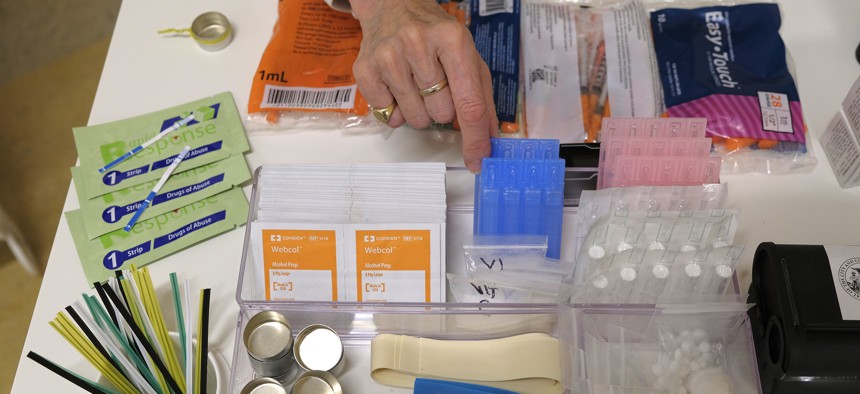Rhode Island Becomes First State to OK Drug Injection Sites

In this Aug. 29, 2018 file photo, Linda Montel shows off supplies on a check in desk at Safer Inside, a realistic model of a safe injection site in San Francisco. AP Photo/Eric Risberg
Advocates say sites where people can use drugs under supervision can save lives. But cities that have tried to establish such centers have faced opposition from their states and the federal government.
Rhode Island is the first state to authorize a drug injection site program meant to combat the opioid epidemic and reduce the number of fatal overdoses.
Gov. Daniel McKee signed the legislation this week that will allow cities and municipalities to approve the operation of so-called harm reduction centers, where people can ingest illegal drugs under the supervision of medical professionals.
There’s significant interest in Providence to open a center, according to state Sen. Joshua Miller, a sponsor of the legislation. But it’s unclear to what end any future proposal would face opposition—either locally or from the federal government.
Under the Trump administration, the Justice Department blocked the opening of a supervised injection site in Philadelphia. A federal appeals court found that the public health initiative broke a federal drug law adopted in 1986 amid the nation’s crack epidemic, that enabled prosecutors to go after unscrupulous property owners who allowed their buildings to be used as drug dens.
“We know we will have to deal with it,” Miller said of the past rulings on the issue. “With a different administration and attorney general on the federal level, we might have a better shot.”
The number of fatal drug overdoses started to decline in the United States in recent years. But suspected drug overdose deaths surged during the coronavirus pandemic, with more than 90,000 deaths reported during a 12-month period that ended in November 2020, according to data from the Centers for Disease Control and Prevention.
Rhode Island recorded 384 fatal drug overdoses in 2020, the most deaths since 2014, and confirmed 140 overdose-related deaths as of June year, according to state health department data.
Advocates say harm reduction centers can help prevent fatal drug overdoses, curb the spread of infectious diseases and provide a connection to substance abuse treatment.
About 10 countries, including Canada, Denmark, France and Germany, allow harm reduction centers to operate. At such centers, people are provided a space to consume pre-obtained drugs while under the supervision of trained staff who can intervene in the case of an overdose.
Lindsay LaSalle, managing director of policy for the Drug Policy Alliance, said evidence collected about harm reduction centers in other countries has shown that they can reduce fatal overdoses and increase the likelihood of a person entering treatment.
“We have to use every public health resource at our disposal—especially the ones we know work,” LaSalle said in a statement.
Rhode Island’s approval stands in contrast to opposition that similar proposals faced in other states. A California bill that would have allowed safe injection sites in San Francisco was vetoed by then-Gov. Jerry Brown in 2018. Since then, legislation to allow such sites has not advanced in the state legislature.
In Rhode Island, it will be months until any proposed centers open—the state’s Department of Health has a deadline of March 1 to devise regulations.
The state’s regulations are likely to lean on the program established in Vancouver, Canada, Miller said.
He acknowledges that local opposition could likely center on the proposed site location. But he believes the impact the opioid epidemic has had on the state has made residents open to the idea.
“We are confident that if a provider in Providence was interested, we have a pretty good path in front of us,” Miller said. “People see how dangerous it’s been for the community.”
Andrea Noble is a staff correspondent with Route Fifty.
NEXT STORY: Purdue Pharma Moves Closer to Opioid Settlement as 15 States Drop Objections





